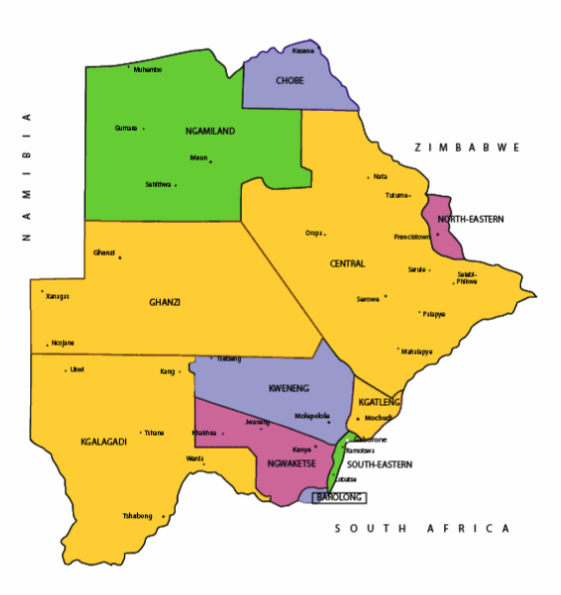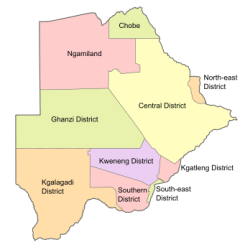Places and their polling stations in Shashe West, Botswana
102 Nshakazhogwe
0524 Nshakazhogwe Primary School
0525 Ndzinge Tent
0526 Nyadza Kgotla
103 Sebina
0527 Sebina Primary School
0528 Sebina VDC Day Care And Pre-School
0529 St. John Church
0530 Apostolic Faith Mission
0531 Sebina Cross (Tent)
104 Marobela
0532 Nyamambisi Primary School
0533 Marobela Main Kgotla
0534 Ntala Veterinary Camp
0535 Mphinyane Primary School
0536 Tlhalogang Mobile Stop
105 Mathangwane
0537 Mathangwane Main Kgotla (Tent)
0538 Mathangwane Primary School
0539 Mashungwa Kgotla (Tent)
0540 Mpatane Primary School
0541 Motsidiemang (Tent)
0542 Metsimasweu Kgotla
106 Chadibe
0543 Kajata Kgotla (Tent)
0544 Chadibe North Primary School
107 Borolong
0545 Tlhalogang JSS
0546 Borolong Primary School
0547 Roads Camp (Tent)
0548 Open Space Next To Tigers Football Club Grounds (Tent)
0549 Rapulane Kgotla
108 Majana
0550 Makobo Primary School
0551 Natale Primary School
0552 Japane Tent
0553 Jamataka Primary School
0554 Kgoronyane Mobile Health Stop
0555 Lekoba Kgotla
0556 Tapaneng
109 Matsitama
0557 Matsitama Primary School
0558 Dzidzipa Mobile Health Stop
0559 Matakana Tent
0560 Splamdraa Tent
0561 Jamini Tent
0562 Takutshane Tent
110 Marapong
0563 Marapong Primary School
0564 Mampori Primary School
0565 Semitwe Primary School
0566 Shorojenaa Mobile Health Stop
0567 Mosu Mobile Health Stop
0568 Maothakgang Mobile Health Stop
0569 Mmapatse Mobile Health Stop
Reference: iec.gov.bw/index.php/electoral-districts/polling-stations.html
Botswana
Botswana is a country in Africa. It is topographically flat, with approximately 70 percent of its territory being the Kalahari Desert.
It is bordered by South Africa to the south and southeast, Namibia to the west and north, and Zimbabwe to the northeast.
Capital: Gaborone
Currency: Botswanan Pula
Official language: English
Population: 2.588 million (2021) World Bank
Dialing code: +267
Gross Domestic Product: 17.61 billion USD (2021) World Bank
Botswana’s ten districts are:
- Southern District
- South-East District
- Kweneng District
- Kgatleng District
- Central District
- North-East District
- Ngamiland District
- Kgalagadi District
- Chobe District
- Ghanzi District
Botswana’s councils created from urban or town councils are: Gaborone City, Francistown, Lobatse Town, Selebi-Phikwe Town, Jwaneng Town, Orapa Town and Sowa Township.






The name Botswana refers to ‘Land of the Tswana’. The landlocked, Southern Africa country is officially known as the Republic of Botswana.














Botswana is connected to Zambia through the Kazungula Bridge making it the world’s shortest border between two countries.
A country of slightly over 2 million people (2021), Botswana is one of the most sparsely populated countries in the world. It is essentially the nation state of the Tswana ethnic group, who make up 79% of the population.

About 11.6 per cent of the population lives in the capital and largest city, Gaborone.
Formerly one of the world’s poorest countries—with a GDP per capita of about US$70 per year in the late 1960s—it has since transformed itself into an upper-middle-income country, with one of the world’s fastest-growing economies.


The Tswana ethnic group were descended mainly from Bantu-speaking tribes who migrated southward of Africa to modern Botswana, living in tribal enclaves as farmers and herders.




In 1885, the British colonised the area and declared a protectorate under the name of Bechuanaland.
As colonisation stopped, Bechuanaland became an independent republic under its current name on 30 September 1966.


Since then, it has been a representative republic, with a consistent record of uninterrupted democratic elections and the lowest perceived corruption ranking in Africa since at least 1998.

The economy is dominated by mining and tourism. Botswana has a GDP (purchasing power parity) per capita of about $18,113 as of 2021, one of the highest in subsaharan Africa.


Botswana is the world’s biggest diamond producing country.
Its relatively high gross national income per capita gives the country a high standard of living and the third-highest Human Development Index of continental Sub-Saharan Africa (after Gabon and South Africa).
The country has been adversely affected by the HIV/AIDS epidemic. In 2002, Botswana began offering anti-retroviral drugs (ARVs) to help combat the epidemic.
Botswana is a member of the Southern African Customs Union, the Southern African Development Community, the Commonwealth of Nations, and the United Nations.

